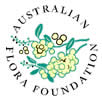Summary of final report on the Australian Flora Foundation funded project:
J.R. Gorst,
Department of Plant Science, University of Tasmania
Like most other members of the Proteaceae, Persoonia seems to present problems in its response to micropropagation techniques. The most significant of these is production of phenolics which leads to rapid blackening and death of explants and which cannot be inhibited by standard anti-phenolic treatments. Until the problem can be overcome, there is no chance of being able to tissue culture Persoonia or to achieve any repeatable success with taking cuttings (some amateur botanists have reported successes with cuttings but the success rates are extremely low and cannot be linked to any particular treatment – Wrigley & Fagg, 1989). The next stage is probably to collaborate with a chemist and attempt to identify the major phenolic(s) produced, in the hope that this might then suggest a means to inhibit synthesis.
Embryo culture of Persoonia is much less successful than for other members of the Proteaceae but, with further experimentation, may prove to be a feasible way of overcoming seed germination difficulties. The experiments have, at least, demonstrated that dormancy is probably linked with inhibitors produced within the seed (since the embryos do show precocious germination when removed from the seed) although there are obviously inherent physiological factors acting, as well, to account for the slow development of seedlings.
